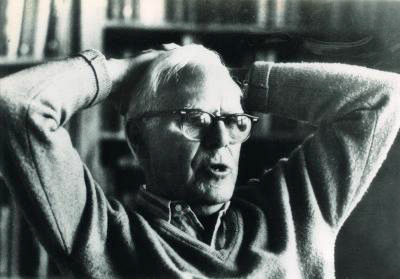Mcgraw Hill, Inc., New York, 1992)
Martin Gardner Frasi e Citazioni
da Gardner on Gardner, in Focus – The MAA Newsletter, v. 14, n. 6, dicembre 1994
Martin Gardner: Frasi in inglese
"Interview: Martin Gardner" by Scot Morris in Omni, Vol. 4, No. 4 (January 1982)
Contesto: Ever since I was a boy, I've been fascinated by crazy science and such things as perpetual motion machines and logical paradoxes. I've always enjoyed keeping up with those ideas. I suppose I didn't get into it seriously until I wrote my first book, Fads and Fallacies in the Name of Science. I was influenced by the Dianetics movement, now called Scientology, which was then promoted by John Campbell in Astounding Science Fiction. I was astonished at how rapidly the thing had become a cult.
The Night Is Large (1996), Introduction to Part III, Pseudoscience p. 171
Contesto: Debunking bad science should be constant obligation of the science community, even if it takes time away from serious research or seems to be a losing battle. One takes comfort from the fact there is no Gresham's laws in science. In the long run, good science drives out bad.
From a book review in The New York Times (9 May 1976) http://select.nytimes.com/gst/abstract.html?res=F40F13FC345E157493CBA9178ED85F428785F9#, also quoted in The American Mathematical Monthly (December 1994)
Contesto: Biographical history, as taught in our public schools, is still largely a history of boneheads: ridiculous kings and queens, paranoid political leaders, compulsive voyagers, ignorant generals — the flotsam and jetsam of historical currents. The men who radically altered history, the great scientists and mathematicians, are seldom mentioned, if at all.
Bernard Sussman, "Exclusive Interview with Martin Gardner", Southwind (Miami-Dade Junior College), Vol. 3, No. 1 (Fall 1968)
Contesto: There are, and always have been, destructive pseudo-scientific notions linked to race and religion; these are the most widespread and damaging. Hopefully, educated people can succeed in shedding light into these areas of prejudice and ignorance, for as Voltaire once said: "Men will commit atrocities as long as they believe absurdities."
Introduction to The Annotated Alice (1960) // The Annotated Alice. The Definitive Edition (1999), by Lewis Carroll (Author, Christ Church College, Oxford), John Tenniel (Illustrated by), Martin Gardner (Editor, Introduction and notes by), page viii
Contesto: The last level of metaphor in the Alice books is this: that life, viewed rationally and without illusion, appears to be a nonsense tale told by an idiot mathematician. At the heart of things science finds only a mad, never-ending quadrille of Mock Turtle Waves and Gryphon Particles. For a moment the waves and particles dance in grotesque, inconceivably complex patterns capable of reflecting on their own absurdity.
Introduction to The Annotated Alice (1960) // The Annotated Alice. The Definitive Edition (1999), by Lewis Carroll (Author, Christ Church College, Oxford), John Tenniel (Illustrated by), Martin Gardner (Editor, Introduction and notes by), page viii
Contesto: The last level of metaphor in the Alice books is this: that life, viewed rationally and without illusion, appears to be a nonsense tale told by an idiot mathematician. At the heart of things science finds only a mad, never-ending quadrille of Mock Turtle Waves and Gryphon Particles. For a moment the waves and particles dance in grotesque, inconceivably complex patterns capable of reflecting on their own absurdity.
“I've never made a discovery myself, unless by accident.”
Quoted in Sally Helgeson, "Every Day", Bookletter, Vol. 3, No. 8 (6 December 1976), p. 8
Contesto: I've never made a discovery myself, unless by accident. If you write glibly, you fool people. When I first met Asimov, I asked him if he was a professor at Boston University. He said no and … asked me where I got my Ph. D. I said I didn't have one and he looked startled. "You mean you're in the same racket I am," he said, "you just read books by the professors and rewrite them?" That's really what I do.
"The Laffer Curve", Knotted Doughnuts and other Mathematical Entertainments (1986)
Contesto: Ideologues of all persuasions think they know how the economy will respond to the Administration's strange mixture of Lafferism and monetarism. Indeed, their self-confidence is so vast, and their ability to rationalize so crafty, that one cannot imagine a scenario for the next few years, that they would regard as falsifying their dogma. The failure of any prediction can always be blamed on quirky political decisions or unforeseen historical events.
"Mathematical Games", in Scientific American (October 1973); also quoted in Roger B. Nelson, Proofs Without Words: Exercises in Visual Thinking (1993), "Introduction", p. v
Notes of a Fringe-Watcher, "The Tragedies of False Memories" Skeptical Inquirer (Fall 1994) http://www.skepticfiles.org/false/mgfmsasc.htm
“As I have often said, electrons and gerbils don't cheat. People do.”
"Science: Why I Am Not A Paranormalist", in The Whys of a Philosophical Scrivener (1983)
Martin Gardner, puzzle master extraordinaire http://www.bbc.com/news/magazine-29688355 obituary by Colm Mulcahy, BBC News Magazine, October 21, 2014
Mathematics, Magic, and Mystery https://books.google.com/books?id=-kOFBQAAQBAJ&pg=PR11#v=onepage&q=%22Mathematical%20magic%20combines%22%23v%3Dsnippet&f=false (1956), p. ix
The Dover Math and Science Newsletter http://www.doverpublications.com/mathsci/0516/d/ May 16, 2011
